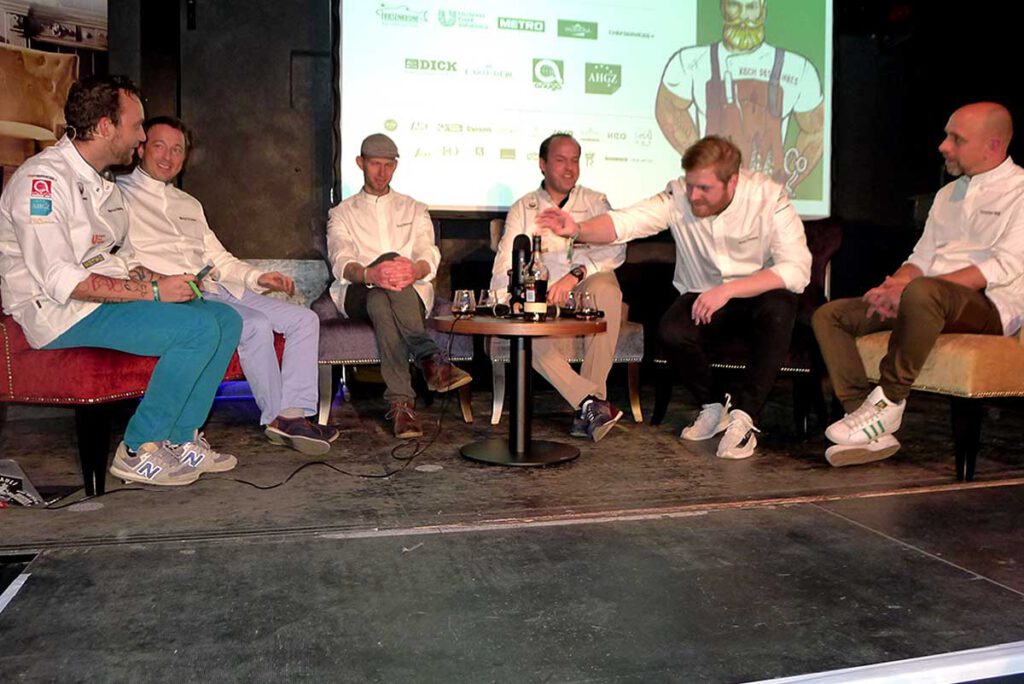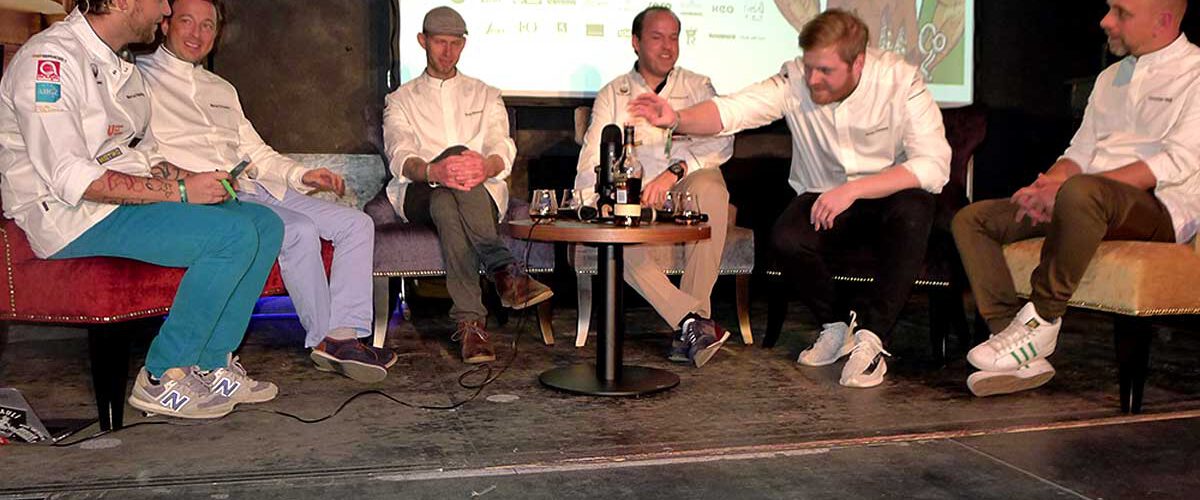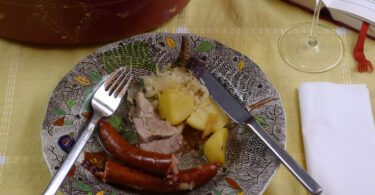
von l.n.r.: Moderator Marcus Hannig, Marian Schneider, Boris Rommel, Tristan Brandt, Ricky Saward, Christian Weij
The accompanying programme at Koch des Jahres is always an enrichment for the audience. The diverse offerings include product presentations, workshops and many other exciting events. I had the pleasure to follow the discussion with the mavericks. Experienced and young restaurateurs discussed trends and developments in the gastronomic scene, the round was moderated by Marcus Hannig, as always in a good mood!
The Mavericks
The Dutch food designer Christian Weij runs his restaurant PUUR-E in the Netherlands.
He is primarily interested in inspiration and the sensual experience, the guest should celebrate his very personal, great restaurant experience. Weij is an expert in the fermentation of food.
What often ends up in our garbage can is the raw material for the food designer’s studies. Rotting vegetables, fermenting juices or rotten fruit, the material for its exciting aromatic metamorphoses!
Ricky Saward exclusively conjures vegetarian in his Seven Swans in Frankfurt, the message to his guests: sustainable, self-growing, regional, back to the basics, seasonal!
The restaurant has 24 seats, a small but fine house. Anything that doesn’t come from the farm itself is collected, wild herbs, forest fruits, flowers.
Tristan Brandt is an established top chef of world renown, a reservation for Opus V in Mannheim, where he swings the cooking spoon, is a challenge. Brandt is also responsible for the Engelhorn Gastronomie in Mannheim, which includes bars and street food projects. His focus is on the training of his employees, who should implement the boss’s ideas on the herds as perfectly as possible..
Boris Rommel is chef at the gourmet restaurant Le Cerf in Zweiflingen-Friedrichsruhe, where he has just been awarded the second Michelin star. Recently his first cookbook «Kochen ist Leben, Zwischen Kunst und Handwerk» (“Cooking is life, between art and craft”) was published, a wonderfully unpretentious work that introduces us to its classic French style with a light pen.
Marian Schneider is the gastronomic director of gastromenü GmbH with 600 employees. The medium-sized food service company serves a wide variety of sectors, a special project being the Wiley Club in Neu-Ulm. The building was completely rebuilt and presents itself as a gastronomic experience.
His concept: All products come from his own bakeries, butcher’s shops, distilleries, orchards and other production facilities. Schneider serves large-scale catering with up to 10000 guests, gastronomic events and traditional gastronomy, but also supplies kindergartens and day care centres.
Regional / Seasonal
Our food should be regional and seasonally fresh, maybe even organic!
It gets difficult when the product is not always available, says star chef Boris Rommel.
He then has to pass because the guest doesn’t like to hear sentences like “Is straight out” or “unfortunately out of stock”, the kitchen has to follow them.
Ricky Saward criticises the industrial standardisation, most of our lettuce heads and cucumbers – like today’s chickens – have been bred in large, largely automatically controlled halls.
The vegetarian cook puts everything on the plate that grows on his acre, no matter if wrinkled, hunchbacked, crooked, too thin or too thick, in the end the aroma decides!
Sawards vegetables come exclusively from his own cultivation, the menu is colourful and seasonal. Especially the vegetarian cuisine requires a lot of effort, demanding palates have to be pleased, a critical clientele has to be served.
With regional products Christian Weij tries to escape from the grey monotony of a globalized haute cuisine. Through creativity and innovation, regional products become interesting. With his development work, the food designer succeeds in distinguishing his culinary creations from the uniformity of the masses.
The food industry is highly globalized, at the same time there is an information vacuum for the consumer, he is insecure. Which of us can determine with absolute certainty whether the vegetables or fruit come from controlled cultivation, whether the working conditions at least meet minimum standards, as it looks with the use of pesticides?
On the other hand, regional products can be traced, we know what happens to them in the food chain until they finally end up on our plates.
Employees
Like so many others in the business, catering entrepreneur Marian Schneider complains about the situation on the personnel market. At the same time, however, he emphasizes that a typical applicant today is very well informed. There are unsolicited candidacies with clear ideas, some want to be involved in event management, others in patisserie, others are interested in haute cuisine. With the structure of the enterprise a broad spectrum can be covered, where in former times in the catering trade often and far traveled, Schneider can offer new coworkers practically everything which the industry gives away.
A large topic is the legally regulated working time, over 8 hours should not be worked! The complaining among restaurateurs is great, but you have to comply with the legislation, overtime is clearly to be paid, not necessarily the rule in gastronomy.
Also for Ricky Saward an 8-hour day is utopian, a job in gastronomy is known to be exhausting.
Recreation / Leisure
Relaxation means something different for every chef. In his spare time Christian Weji continues where he just worked all day, in the kitchen. He loves his job, is a passionate chef, a passionate designer. He uses his free time to further develop fresh ideas or new, unusual concepts.
Boris Rommel, the talented chef, draws a clear line between work and leisure, there must be time to relax on Sundays and Mondays. After all, there is a sous-chef and a good brigade that is happy to assist the chef.
Guests / Reservations
Guests in our country still lack an awareness of quality and performance in gastronomy. Ticket systems for restaurant bookings are becoming more and more popular on the market, elsewhere they have long been standard! Often – even for larger companies – the ticket is cancelled at the last second, resulting in a loss of turnover and profits for the restaurant.
As is well known, calculations are made at the limit, for small houses repeated failures can endanger their existence. Ticket shops are also cost-effective for smaller businesses and offer great advantages over the traditional voucher system. The ticket is booked for a certain topic, for example dinner for two, barbecue evenings or gala menus, the decisive difference: In contrast to the voucher, the ticket is forfeited if the customer does not show up, but the turnover, which is important for the business, is still flushed into the till. A radical implementation would, however, meet with resistance in Germany at the moment the aim is to educate the guest bit by bit.
Multiple reservations are a nuisance for the sector, some guests reserve tables in different locations and then spontaneously decide on a particular restaurant.
Trouble, losses and stress are inevitable for the chefs, a bad habit! The real gourmets, who may be desperately hoping for a place in the restaurant of their dreams, look down the tubes in this game.
[typography font=”Abril Fatface” size=”20″ size_format=”px” color=”#e1cca1″][dropcap]A[/dropcap][/typography] good talk, a cooking competition is not only culinary, but in a way also a mirror of current developments. The industry is struggling, but there is potential. With good concepts, self-confidence and visions, some excellent restaurateurs are playing in the concert of the greats. If they keep up with the times, even small companies need not fear the market. An online ticket system offers many opportunities, minimizes risks and is cost-effective. Don’t worry, the guest will get used to it!
![[:de]Grandgourmand, Travel, Food, Lifestyle[:]](https://grandgourmand.de/wp-content/uploads/2023/01/logo_23_1-1.png)




